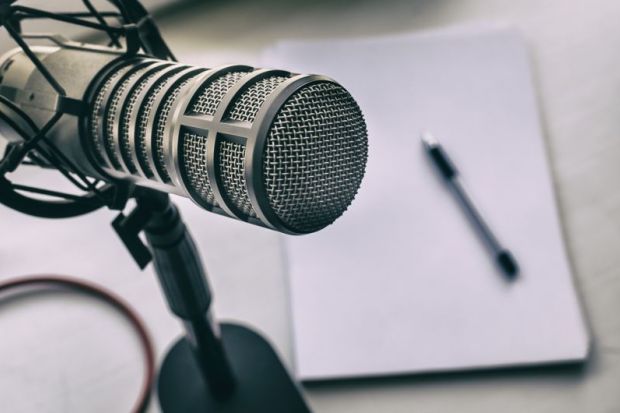Podcasting in academia has the potential to be radically open.
Open because it enables those unable to attend classes the chance to sample higher education remotely, because ideas explored in conversation are often expressed in more accessible language than in articles or books and because it allows students to expand their learning, giving a public voice to the type of questions that those immersed in academia might fail to ask.
And yet podcasting in academia is, for the most part, terrible.
Recording endless reams of class or guest lectures and dumping them online is not particularly useful for opening access to knowledge.
It may promote the university, though this is doubtful. Nevertheless, it is with similar logic that universities produce conference or public lecture videos. For the most part, such podcasts and videos are dry, distanced and often sound as if they have been recorded through a wet sock by a man trapped in a cave on a windy day.
Podcasting – audio on demand – can be so much more.
Thinking about what universities could and should be is never far from the thoughts of many at the Central European University in Budapest, Hungary, because the institution is currently under a prolonged attack from an authoritarian government.
CEU runs a series of different academic podcasting activities, such as workshops for students, staff and faculty who wish to podcast their research, class modifications that allow students to produce audio assignments instead of papers and a media project with the Open Learning Initiative (OLIve) for refugee and asylum-seeker students. Each of the different approaches point to ways in which podcasting can change academic practices for the better.
For example, a podcasting element of the special weekend course for refugee and asylum-seeker students was simple. Two or three students volunteered each week to interview the guest lecturer about the content of the session. A small and relatively cheap studio was set up and after each class students produced a 15-minute episode about key learning takeaways, their thoughts and their understandings.
One of the benefits for students was the possibility to revise and review the class’ content. This was especially useful for those whose English skills were still developing or those who were unable to leave their refugee camps that week. It also increased learner engagement, because students who knew they would have to ask a question paid particularly close attention in class.
Beyond this, podcasting enabled the students to subvert inherent classroom hierarchies, because they controlled the post-class discussion with the lecturer.
Students used the opportunity not only to reflect on what it was like to be in a country where thousands of billboards and newspaper adverts made it clear they were unwelcome but also to challenge news editors about their representations of Islam, to disagree with a speaker from UNHCR about the need to enter into dialogue with racists and to ask journalists why a bombing in Manchester receives more coverage than one in Afghanistan.
As one student from Nigeria put it, “hearing my own voice gave me confidence to keep on asking”. A student from Afghanistan said that, “by listening I realised myself the mistakes I made, and how I could improve my questions”.
There are other options, even for teachers who encounter masses of bored faces at 9am.
One, tried at CEU with graduate students, was to produce a podcast instead of a final paper. Aside from making marking a little more interesting for teachers, the general effect was that students became more engaged in their chosen topics.
Because the podcasts had the possibility of going public, students spent more time working on their assignments than usual and made sure, as one especially eloquent podcaster put it, “to check that I wasn’t saying something that was obviously bullshit”.
Of course, working with students closely on such projects takes time, a certain amount of conceptual and technical knowledge and a university management that allows teachers to take risks.
However, the experience can also equip teachers with the tools that they need to produce podcasts based on their own research, sidestepping journals’ paywalls to create open audio versions of their papers.
Podcasting, like all new technologies, has the potential to improve higher education, but only if it is used in a way that puts teaching and learning at its centre. On-demand audio can open up knowledge, but it needs to be wrested back from clutches of those who are unable to see beyond uninspired mass recordings, so that it can be exploited to its full potential.
Ian M. Cook is a research fellow at the Central European University.
Register to continue
Why register?
- Registration is free and only takes a moment
- Once registered, you can read 3 articles a month
- Sign up for our newsletter
Subscribe
Or subscribe for unlimited access to:
- Unlimited access to news, views, insights & reviews
- Digital editions
- Digital access to THE’s university and college rankings analysis
Already registered or a current subscriber?




